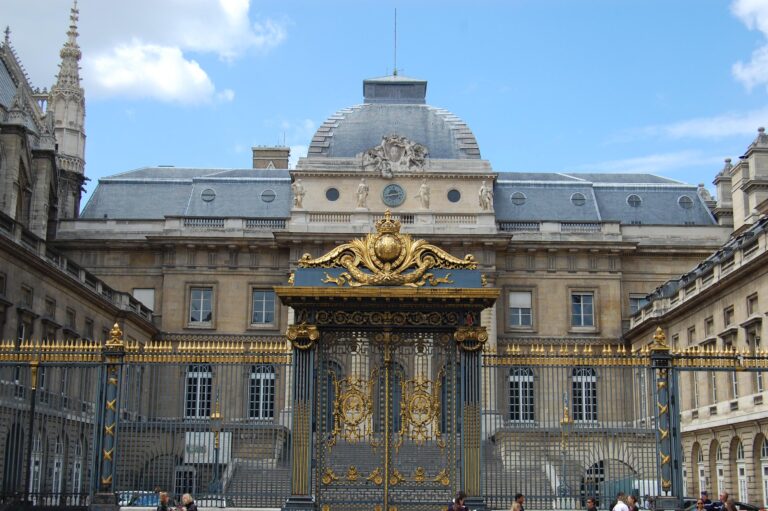In a landmark ruling, a Paris court has convicted former French President Nicolas Sarkozy of criminal conspiracy in connection with the financing of his 2007 presidential campaign by the late Libyan leader Muammar Gaddafi. The court’s decision marks a significant moment in a protracted legal saga that has cast a long shadow over Sarkozy’s political legacy. Accusations of illicit funding have dogged the former president for years, raising questions about the integrity of political financing in France. As Sarkozy faces a sentence of imprisonment, this case underscores the intricate links between politics and international relations, as well as the enduring repercussions of past alliances in the tumultuous landscape of Middle Eastern politics.
Impact of Court Ruling on Sarkozy’s Political Legacy
The recent conviction of Nicolas Sarkozy by a Paris court has far-reaching implications for his political legacy. As a former president, his reputation was already marred by various scandals; however, this ruling could overshadow his achievements while in office. With a guilty verdict for criminal conspiracy connected to the alleged funding from Libyan leader Muammar Gaddafi during his 2007 electoral campaign, Sarkozy now faces renewed scrutiny. The case not only highlights the ethical challenges in political funding but also raises questions about the integrity of France’s political system during his leadership.
This ruling serves as a critical moment in shaping perceptions of Sarkozy’s tenure. Observers note that it could influence the trajectory of his political party and others in the conservative spectrum, prompting calls for greater transparency in campaign financing. The effects of this conviction may extend beyond mere legal ramifications, potentially reshaping the landscape of French politics, driving factions to distance themselves from his controversial legacy. Key considerations include:
- Impact on Sarkozy’s party and its future electoral strategies.
- Potential shifts in public trust towards political institutions.
- Legacy of corruption scandals influencing upcoming elections.
Insights into the Gaddafi Funding Allegations and Legal Proceedings
The recent conviction of Nicolas Sarkozy has reignited discussions surrounding the controversial allegations of illicit funding linked to the late Libyan leader Muammar Gaddafi. The former French president has been sentenced for his involvement in a corrupt scheme to receive financial backing from Gaddafi’s regime during his 2007 presidential campaign. Disturbingly, evidence presented during the trial suggested that Sarkozy was aware of the illegitimacy of these funds, raising questions about transparency and ethical conduct in political financing. The ramifications of this case extend beyond Sarkozy, highlighting broader issues of accountability among world leaders.
Among the most significant outcomes of this legal battle are the potential shifts in public perception and political alliances. Allegations include:
- Secret negotiations: Claims suggest Sarkozy engaged in covert discussions with Libyan officials.
- Misappropriated funds: Evidence indicates that millions were channeled illegally into his campaign.
- Impact on France-Libya relations: Sarkozy’s actions may have jeopardized diplomatic ties between the two nations.
As the legal proceedings unfold, they serve as a crucial reminder of the need for reform in political funding practices to ensure integrity and prevent corruption. Emphasizing accountability will be essential in restoring public trust in political institutions across France and beyond.
Potential Implications for French Political Landscape
The conviction of Nicolas Sarkozy could usher in a new chapter in French politics, influencing both the current administration and future elections. This landmark ruling might invigorate opponents within the political landscape, as it casts a long shadow over Sarkozy’s legacy, particularly for the center-right Republicans, the party he once led. Reactions are expected to be polarized as various factions grapple with the implications. Potential scenarios include:
- Resurgence of Left-Wing Politics: With Sarkozy’s fall from grace, there may be an opportunity for left-leaning parties to capitalize on the discontent of voters seeking alternatives.
- Fragmentation of the Republicans: Internal divisions could deepen, leading to challenges in uniting the party behind a single candidate in future elections.
- Impact on Macron’s Governance: The ruling might embolden Macron’s administration, allowing it to position itself as a stabilizing force against political upheaval.
Moreover, this ruling sets a precedent for accountability among political leaders, potentially redefining public expectations regarding corruption and electoral integrity. As the public digests the news, sentiment could shift towards demanding greater transparency in campaign financing, not only for Republicans but across all political parties. This situation could lead to legislative reforms aimed at strengthening regulations governing political donations and international financing sources. The potential outcomes might include:
| Outcome | Description |
|---|---|
| Increased Scrutiny | Heightened public interest in campaign finance will likely result in calls for stricter oversight. |
| Political Reform | Proposals for new laws may emerge to curb illicit funding and promote transparency. |
Analysis of Public Reaction and Trust in Leadership
The conviction of former French president Nicolas Sarkozy for his involvement in the Gaddafi funding case has sparked a significant public response, reflecting deep divisions in societal trust toward political leadership. Many citizens express feelings of betrayal, citing a growing skepticism about the integrity of elected officials. Key sentiments emerging from the public discourse include:
- Disillusionment: A portion of the populace feels increasingly disconnected from the political elite, viewing allegations like Sarkozy’s as symptomatic of systemic corruption.
- Support for Accountability: Conversely, some citizens applaud the legal system’s readiness to hold high-profile figures accountable, hoping it marks a shift towards greater transparency.
- Fear of Political Instability: The case has led to concerns about potentially exacerbating political divisions within France, raising questions about the future of governance.
This atmosphere of uncertainty is further compounded by polls indicating fluctuating public trust in institutions. A recent survey shows a stark contrast in perceptions regarding political leaders before and after the verdict:
| Confidence Level (%) | Before Verdict | After Verdict |
|---|---|---|
| High Confidence | 52% | 37% |
| Medium Confidence | 30% | 25% |
| Low Confidence | 18% | 38% |
The downward shift in confidence underscores a growing narrative among the French populace that their leaders may not be acting in their best interests, ushering in a period that may redefine political engagement and electoral sentiment in France.
In Summary
In conclusion, the conviction of former French President Nicolas Sarkozy marks a significant chapter in the ongoing investigations into the financing of his 2007 election campaign. The ruling by the Paris court, which identifies Sarkozy’s involvement in a complex web of criminal conspiracy linked to Libyan leader Muammar Gaddafi, underscores the challenges and controversies surrounding political funding in France. As the legal repercussions unfold, this case not only raises questions about accountability at the highest levels of government but also reasserts the necessity for transparency in political financing. With appeals likely on the horizon, the implications of this verdict will resonate throughout France’s political landscape and could potentially influence future electoral strategies and legislation. As the nation watches closely, the intersection of politics, ethics, and the law remains ever relevant in the discourse surrounding governance.




